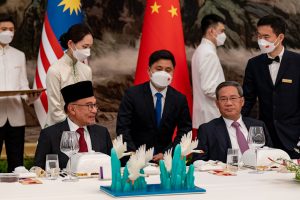The Malaysian government has been forced to clarify its position on the maritime and territorial disputes in the South China Sea, after an outbreak of partisan mud-slinging between Prime Minister Anwar Ibrahim and opposition leader Muhyiddin Yassin.
The dispute has centered on comments that Anwar made on April 4, shortly after his return from a state visit to China. Reporting to Parliament on his trip, Anwar said that Chinese officials had expressed concerns about the state energy firm Petronas’ involvement in the Kasawari gas field, which sits in a part of the South China Sea claimed by both Beijing and Kuala Lumpur.
The Malaysian leader also said he was open to negotiations with Beijing over disputed areas. “If the condition [from Beijing] is that there must be negotiation, then we are ready to negotiate,” Anwar said, according to Reuters.
This provided an opening for Muhyiddin to claim that his political rival had indirectly acknowledged China’s claim over Malaysia’s portion of the South China Sea, and implied that he was willing to give up the Petronas project.
“This statement is reckless and should never be issued by a prime minister,” Muhyiddin was reported as saying. “The indirect implications of this statement have indirectly acknowledged the Chinese claim to territories that are already Malaysian territory that must be defended.”
In its statement published on Saturday, which followed claims by Anwar that his comments had been badly misinterpreted (“If we are not going to discuss, are we going to war then?”), the Ministry of Foreign Affairs said that the country’s position on the South China Sea was “consistent and remains unchanged.”
“The Government of Malaysia is unequivocally and firmly committed to protecting Malaysia’s sovereignty, sovereign rights and interests in its maritime areas in the South China Sea, as depicted by our 1979 Map,” it said.
The 1979 Map refers to the New Map Showing the Territorial Waters and Continental Shelf Boundaries of Malaysia, published by the Directorate of National Mapping that year, which illustrates the country’s claims over maritime features and waters in the South China Sea and elsewhere. (At the time of its drafting, Malaysia was more concerned about rival claims from Vietnam and the Philippines than it was about Chinese claims.)
By employing the term “negotiation,” the statement continued, Anwar was “simply stating that issues relating to the South China Sea should be discussed or resolved in a peaceful manner, utilizing existing platforms and through diplomatic channels, and without compromising Malaysia’s principled position, to avoid any escalation of disputes and the threat or use of force.”
Since 2011, Petronas Carigali, a wholly-owned subsidiary of the Malaysian state oil firm Petronas, has developed and operated the Kasawari gas field, which sits about 200 kilometers off the coast of Sarawak inside a part of Malaysia’s Exclusive Economic Zone (EEZ). The Kasawari field is one of several that Petronas operates inside Malaysia’s EEZ, parts of which are embraced by Beijing’s expansive “nine-dash line” claim. This has resulted in a number of recent encounters with Chinese vessels that have been deployed to the area to back up Beijing’s claims.
The spat is an outgrowth of the bitter political relationship between Anwar and Muhyiddin, a former prime minister, who vied to form a government after the inconclusive general election in November. Since then, the rivalry has been ratcheted up by the Anwar administration’s pursuit of Muhyiddin’s Bersatu party for corruption, prompting claims that it is seeking to hobble its main political challenger.
As Prashanth Parameswaran, formerly of The Diplomat, noted yesterday, the controversy over Anwar’s comments was just the latest manifestation of a sobering trend: “that the country’s political divisions are impacting strategic foreign policy questions which require substantive decisions that need to be carefully deliberated and made.”

































